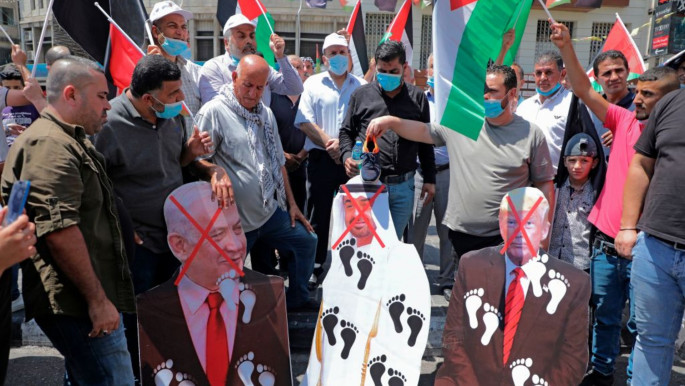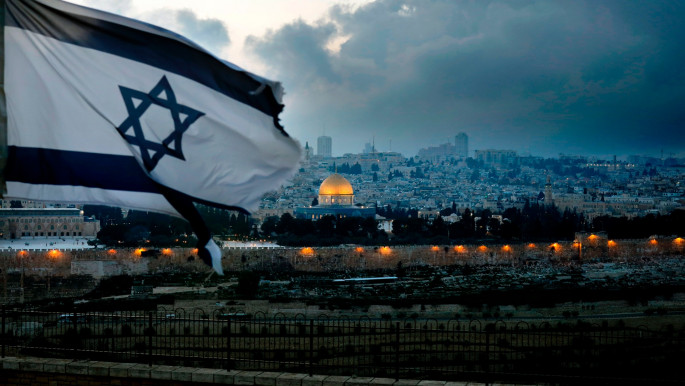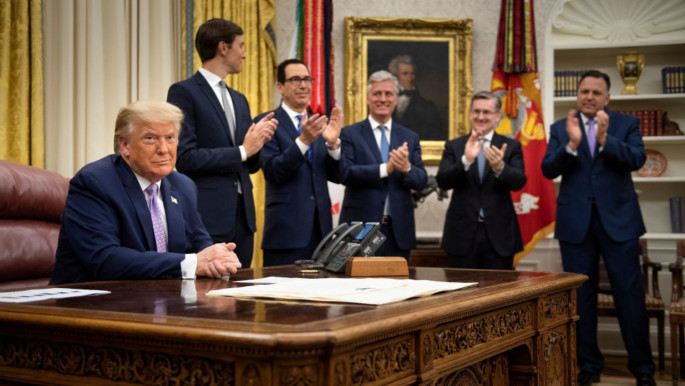How the Israel-UAE alliance formalises new fault lines in the Middle East
The tripartite announcement by the US, Israel and the United Arab Emirates (UAE) of "full normalisation" between Abu Dhabi and Tel Aviv was described by Palestinian political, social and cultural circles as a betrayal.
While the announcement was not surprising given the open secret of warm UAE-Israeli relations, it was nonetheless shocking for many reasons. This agreement is not a peace deal. The UAE was never at war with Israel.
Warm overtures and ties with Israel have been developing for the past twenty years and have become more public in recent years. This deal is also not related to supporting Palestinian rights, as UAE rulers have tried to claim.
In fact, the Trump administration's decision to withhold, for now, support for Israel's formal annexation of large parts of the occupied West Bank was well known in Palestinian political circles before the deal's announcement.
However, the UAE-Israel deal formalises the realignment of fault lines in the Middle East, a process which has been taking shape in increasingly violent ways over the past decade.
This transformation was facilitated by the weakening of former giants in the region - Egypt, Iraq, and Syria - whose weakened states provided the opportunity for new rules and new alliances.
 |
The UAE-Israel deal ushers in an alliance that defies traditional common denominators and sidelines the Palestinian cause |  |
The UAE-Israel deal ushers in an alliance that defies traditional common denominators and sidelines the Palestinian cause, which is still championed by the Arab public. The anchors of this new alliance are the militaristic and extraterritorial aspirations of Israel, the UAE, and Saudi Arabia in the face of the rising and antagonistic regional influence of Turkey and Iran.
Arms sales, including the UAE's desire to purchase the much coveted F-35 US jets, and intelligence cooperation are just two key areas that drove this relationship to the daylight at a time when it could prove highly beneficial to Trump and Israeli Prime Minister Benjamin Netanyahu.
 |
|
| 'Deal of shame': UAE formally endorses Israel's occupation of Palestine |
The "ideology" of maximum pressure against opposition is also a new common denominator in this alliance. That's why dissent against the deal is not tolerated in the UAE. Scores of Emiratis, Palestinians, and others have already been jailed for voicing opposition to this deal.
It is too big and too important to be "undermined" by freedom of expression. The Trump administration also prefers blind loyalty, which explains why Jared Kushner criticised Kuwaiti opposition as unconstructive.
These new fault lines have been building for years, with the UAE taking the lead in their formation. As early as 2006, bridges with Israeli businesses were strong enough for the Chairman of Israel's largest shipping company to lobby, albeit unsuccessfully, in the United States for a deal that would have given a UAE company control over several US port terminals.
By 2009, Abu Dhabi's secret anti-Iran alliance included the UAE signing a deal with an Israeli military company to buy military drones. Even though this particular deal fell through, creating a crisis between the UAE and Israel, the fallout was resolved and full cooperation resumed by 2012 with strong US involvement. The priorities of Mohammed bin Zayed (MBZ) were clear: confront Iran and crush the Muslim Brotherhood and do it by allying with the US and Israel.
 |
The fault lines in the region have shifted and a dramatic adjustment is required to save Palestinian rights and the Palestinian polity from further painful blows |  |
The rise of Muslim Brotherhood affiliates to power in Egypt and Tunisia following the Arab Spring further sharpened the UAE's policy outlook, pushing the rulers to adopt a far more aggressive policy, including designating the group as terrorists. Leaked US cables show that even before the Arab Spring, MBZ was opposed to elections in the region and instead wanted to focus on confronting Iran and Islamic groups, specifically the Muslim Brotherhood and its Palestinian ally Hamas.
He insisted that the UAE and other Gulf countries could deliver the Palestinians and forge a new era of normalisation with Israel if only the US took care of Iran. When delivering the Palestinians failed, MBZ forged ahead without them.
MBZ created a role for the UAE that far outstretched its conventional spheres of influence, earning him the attention and admiration of friends in Washington and beyond. In fact, he had enough influence to secure the US endorsement of his friend Mohammed bin Salman (MBS) as Crown Prince of Saudi Arabia, setting the region up for a period of violent interventions and wars in Yemen and elsewhere.
 |
|
| The day after annexation: Israel, Palestine and the one-state reality |
The UAE has had direct and indirect military interventions in Yemen, Syria, Libya, Egypt, and beyond. UAE military and economic influence also extends to the Horn of Africa, where the UAE has built military bases, and Central Asia to counter any ambitions of Turkey and Iran, MBZ's regional rivals. All the while, economic, intelligence, and military cooperation with Israel was growing in plain sight.
MBZ also found a natural ally in the Trump administration. Trump's policy priorities, including reversing the Obama policies on Iran and elsewhere in the region, aligned with the UAE ruler's agenda. The UAE also pumped millions of dollars into US lobby groups to push for favourable policies against Iran, the Muslim Brotherhood, and Qatar as well as to ensure that no restrictions are applied to US arms sales to the UAE or Saudi Arabia because of their human rights violations in the war in Yemen.
Despite his mishaps and unilateral steps, including in Libya, MBZ proved unstoppable. His agenda has complete support in the Trump White House while also building bridges with a possible Biden administration.
 |
The Palestinian national movement as a whole, in all its political leanings, faces an unprecedented test tantamount to an existential threat |  |
Palestinians find themselves stranded on an island of old calculations. It is now clear that other Arab countries may follow the UAE's lead, especially countries in the UAE sphere of influence like Sudan. A nod from the eager Mohammed bin Salman in Saudi Arabia could also encourage a country like Bahrain to proceed with normalisation. The fault lines in the region have shifted and a dramatic adjustment is required to save Palestinian rights and the Palestinian polity from further painful blows.
The way forward for Palestinians must depart from conventional Palestinian political wisdom, which relied on robust, albeit mostly rhetorical, support from Arab regimes as the foundation of Islamic and international support for the Palestinian cause.
Palestinians must first look inwards and rethink their social contract in a way that ensures rejuvenation of their institutions and a change in their policy, decision-making, and outlook. They need to protect their national aspirations and rights from permanent decimation if Trump's annexation plan is forcefully implemented.
 |
|
| Beware the US-Israel-UAE strategic agenda for the Arab region |
The political establishment in Palestine, including the opposition, must come to terms with these new realities and allow for a new phase in Palestinian politics, led mostly by more youthful figures who are not tainted by past mistakes or alliances. Elections are only one component of such a transformation.
Concurrently, Palestinians need to forge a new foreign policy strategy based on renewed alliances with progressive allies around the world.
To help secure the Palestinian right to independence and freedom, the Palestinian issue must be freed from traditional restraints and instead rely on international law, as well as commitment to human rights and social justice, as the global base of support that will protect and boost Palestinian rights.
The Arab people remain hostage to their rulers and their will is subdued by their captors' iron fists. While their continued support is invaluable to Palestinians and it could be a force for change in the future, Palestinians must now look beyond the boundaries of the region for effective support that can impact policy.
This requires re-engagement with civil society organisations, progressive movements, intellectuals, and other grassroot organisations, especially in democracies that respect and are affected by public opinion and social mobilisation.
The Palestinian national movement as a whole, in all its political leanings, faces an unprecedented test tantamount to an existential threat. Palestinians cannot afford to play by the old rules and players while the reality and rules of the regional "game" have been transformed.
Without a quick and correct adjustment, Palestinians risk having this new hostile alliance dictate change for them to suit its ends, which Palestinians view as diametrically opposed to their rights and aspirations. If anything, this new deal has forced a moment of truth on Palestinians that has been a long time coming.
Nour Odeh is a political analyst and public diplomacy consultant. A former award-winning journalist, Odeh was also Palestine's first female government spokesperson
Follow her on Twitter: @nour_odeh





 Follow the Middle East's top stories in English at The New Arab on Google News
Follow the Middle East's top stories in English at The New Arab on Google News


